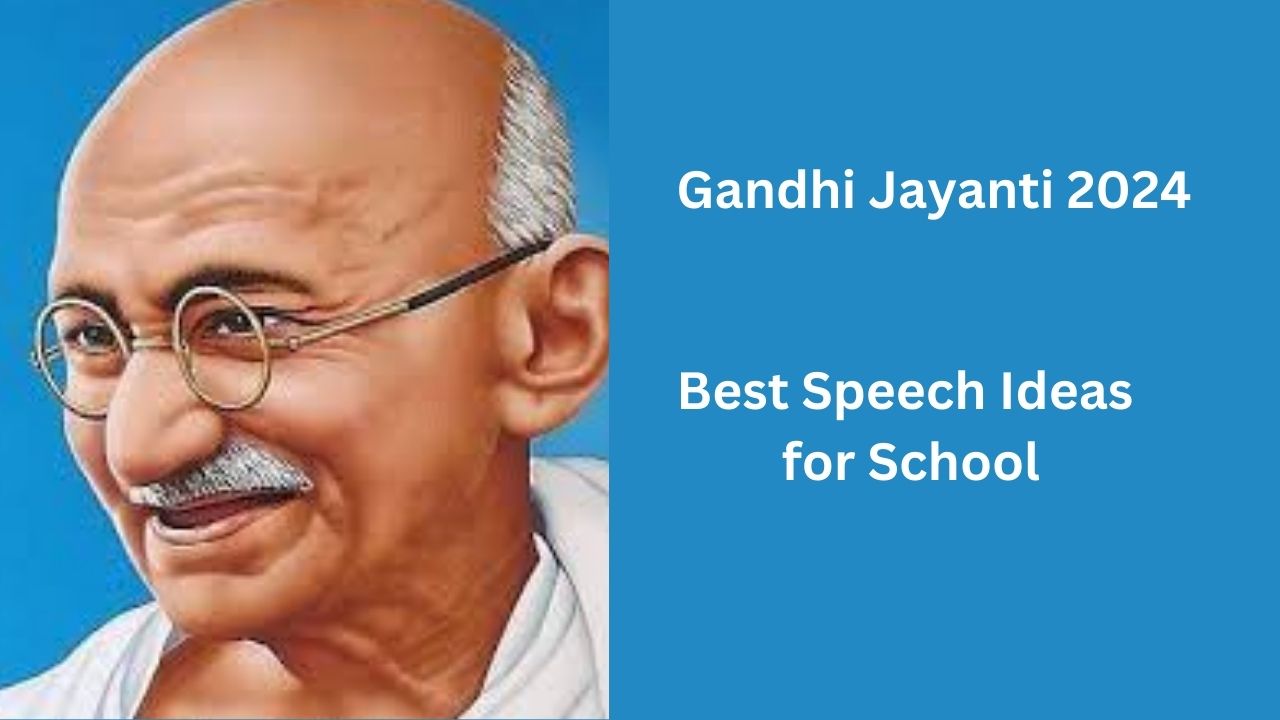Gandhi Jayanti is a national holiday in India, observed every year on October 2nd to commemorate the birth anniversary of Mohandas Karamchand Gandhi, fondly known as Mahatma Gandhi. He was a leader who played an instrumental role in India’s struggle for independence and became a global symbol of non-violence and peace. Celebrating Gandhi Jayanti in schools and colleges often includes speeches, essays, and programs to honor his life and teachings.
Below, we provide some engaging speech ideas for Gandhi Jayanti 2024, tailored for students of different ages and audiences. These speeches reflect on Gandhi’s influence and how his teachings are relevant today, offering opportunities for school students to inspire others.
Short Speech Ideas for School Students
1. Gandhi: The Father of the Nation
Mahatma Gandhi, widely known as the Father of the Nation, dedicated his life to India’s freedom from British rule. What makes him truly special is his approach to achieving this freedom. Unlike many other revolutionaries, Gandhi advocated for peaceful methods and non-violent resistance. His philosophy of non-violence (Ahimsa) and truth (Satyagraha) formed the foundation of his work. On this Gandhi Jayanti, let us remember his values and practice peace and tolerance in our daily lives, whether at school, home, or in society.
2. The Legacy of Mahatma Gandhi
Gandhi’s legacy is not just limited to India; his message of non-violence has inspired global leaders, including Martin Luther King Jr. and Nelson Mandela. Gandhi believed in the power of peaceful resistance and fought for equality, justice, and freedom. On Gandhi Jayanti, we are reminded of his immense contributions and how his vision for a peaceful world is still relevant today. We can honor his legacy by choosing to resolve conflicts with love and understanding rather than aggression.
3. Gandhi’s Teachings in Today’s World
In today’s fast-paced world, where conflicts arise between nations, communities, and individuals, Gandhi’s teachings stand as a beacon of hope. His belief in non-violence offers a roadmap to resolving disputes without bloodshed. Today, as we celebrate Gandhi Jayanti, let us pledge to embrace non-violence in our lives and learn to solve problems through dialogue and cooperation.
Long Speech Ideas for Gandhi Jayanti 2024
1. Mahatma Gandhi: A Global Icon of Peace and Non-Violence
Mahatma Gandhi’s influence extends far beyond the borders of India. His life and work have become a symbol of peace and non-violence across the globe. Born on October 2, 1869, in Porbandar, Gujarat, Gandhi studied law in London before working in South Africa, where he first developed his unique methods of non-violent protest.
Gandhi’s approach to social and political issues was rooted in his deep commitment to truth and non-violence. His method, known as Satyagraha, emphasized the power of peaceful resistance in the face of oppression. This philosophy became a powerful tool during India’s fight for independence, inspiring millions to rise against colonial rule without resorting to violence.
In addition to his political activism, Gandhi was also a strong advocate for social reform. He fought for the rights of the marginalized, including women, Dalits (formerly known as untouchables), and those oppressed by poverty. His emphasis on self-reliance and his vision of an India where all communities could live in harmony are values we can all embrace today.
As we celebrate Gandhi Jayanti in 2024, we must ask ourselves how we can continue to honor his legacy. Whether through small acts of kindness, choosing peace over conflict, or working to create a more inclusive society, Gandhi’s teachings offer a timeless guide to living with integrity and compassion.
2. The Importance of Non-Violence: Gandhi’s Greatest Gift to the World
One of Mahatma Gandhi’s most significant contributions to the world is the principle of non-violence, or Ahimsa. Gandhi believed that non-violence was not just the absence of physical violence but also the refusal to harbor hatred or ill-will towards others. He believed that only through love, understanding, and compassion could lasting change be achieved.
Gandhi demonstrated the power of non-violence through the Indian independence movement. He led several peaceful protests, such as the Dandi Salt March in 1930, which challenged the British-imposed salt tax. These non-violent demonstrations united people across the country and eventually led to India’s independence in 1947.
Non-violence is more relevant today than ever before. In a world where tensions often escalate into violence, Gandhi’s approach reminds us that peaceful dialogue can resolve conflicts and heal divisions. On this Gandhi Jayanti, let us remember that choosing non-violence in our interactions can lead to more harmonious relationships and a more peaceful world.
3. Gandhi’s Vision of Education: Learning Beyond Textbooks
Another crucial aspect of Gandhi’s philosophy was his approach to education. He believed in a holistic form of education that went beyond textbooks and rote learning. For Gandhi, true education involved the development of character, ethics, and a sense of social responsibility. His model, often called “Nai Talim” or Basic Education, emphasized the importance of learning by doing.
According to Gandhi, education should not only impart knowledge but also help individuals become self-sufficient and responsible members of society. He believed that practical skills like weaving, farming, and handicrafts were as important as academic knowledge. This holistic approach aimed to bridge the gap between intellectual knowledge and practical skills, fostering both mental and physical development.
In today’s context, Gandhi’s views on education encourage us to rethink how we approach learning. Instead of focusing solely on grades and exams, we should strive to nurture creativity, empathy, and social responsibility in students. As we celebrate Gandhi Jayanti this year, let us reflect on how we can incorporate these ideals into our education system to create more well-rounded individuals who can contribute positively to society.
How to Deliver a Memorable Speech on Gandhi Jayanti
1. Start with a Quote
Begin your speech with one of Gandhi’s famous quotes. For example, “Be the change you wish to see in the world” is a powerful statement that captures the essence of Gandhi’s teachings. Starting with a quote will not only engage your audience but also set the tone for your message.
2. Focus on Key Themes
The core themes of Gandhi’s life—non-violence, truth, self-reliance, and social justice—are timeless. When preparing your speech, focus on one or more of these themes and explore how they are still relevant today. Use examples from history and current events to illustrate your points and make your speech more relatable.
3. End with a Call to Action
Conclude your speech by encouraging your audience to apply Gandhi’s teachings in their daily lives. Whether it’s practicing non-violence in their interactions or working toward social justice, a call to action will leave your audience feeling inspired and motivated.
Gandhi Jayanti is not only a time to remember the remarkable contributions of Mahatma Gandhi but also an opportunity to reflect on how his teachings continue to resonate in our modern world. His values of truth, non-violence, and social justice are as relevant today as they were during his time. As we commemorate his birth anniversary, let us pledge to live by these values and work towards a more peaceful, just, and compassionate world. Through our actions, we can keep Gandhi’s legacy alive for future generations.

